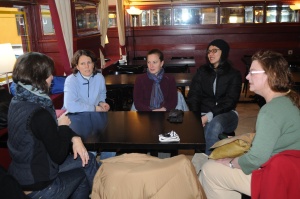We made plans to gather once we dropped our respective children off at Colegio Públic Portugal. The few of us who spoke English as our primary language gathered on the sidewalk in front of the school and engaged in excited chatter. Our group of six moved across the street to a café where we could get to know one another (I was the newest English speaker). After ordering a round of “café con leches” Spanish was not to be heard again for another hour.
We discussed the challenges to living in Madrid; our various stages in learning to speak Spanish; what we thought of the school; how schools here compared to those in “the States”, and for those who had been in Madrid longer; how Colegio Públic Portugal compared with their other school experiences in Spain. Side conversations broke off among those who actually were working in Madrid and those whose primary work involved taking care of the home and children. There were discussions about the primacy of English in the scientific community and how that made it easier for the biology professor who was in Madrid for Sabbatical to easily interact with colleagues, but had slowed his development of learning Spanish. Someone was discussing recent Spanish political history since Franco. Another person mentioned how geography impacts cultural behavior in relation to why Spaniards do not tend to speak another language (same for those in the US).
Somewhere in the midst of all of our discussions it hit me. We were immigrants in a country speaking our native language (loudly I might add) and those who walked by our table or who had the misfortune to sit near us, for the most part, had no clue what we were talking about. How many times had I observed this same phenomenon in the US? A group of Latinos, Russians, Arabs, Turks excitedly talking among themselves about God knows what–and the often-scornful looks given to them. Sometimes I overhear the phrase uttered under the breath: “They are in America! Why don’t they learn to speak English?”
And I now understand. The people talking amongst themselves are most likely seeking a reprieve from having to speak a language that is not their native tongue. Maybe they feel as a member of our group feels “I am just not as interesting in Spanish as I am in English”. Developing language fluency to the point where one can be as expressive in the acquired language as the original takes a lot of work and time. And sometimes you just want to be the person who can tell a joke or discuss an idea with out having to pause and search for a word that you may or may not know to express yourself.
There is another factor in this desire to speak your native language with someone from your home country. They are from your home country. It is amazing that our group covered the geography of the U.S., but we were all from the States. For that shared moment in time we were united by our connection to the “motherland”. We had, for an hour, a little bit of home with us.
Is this how those who are in the U.S. feel when they connect with someone from their home country and who speaks their native language?




